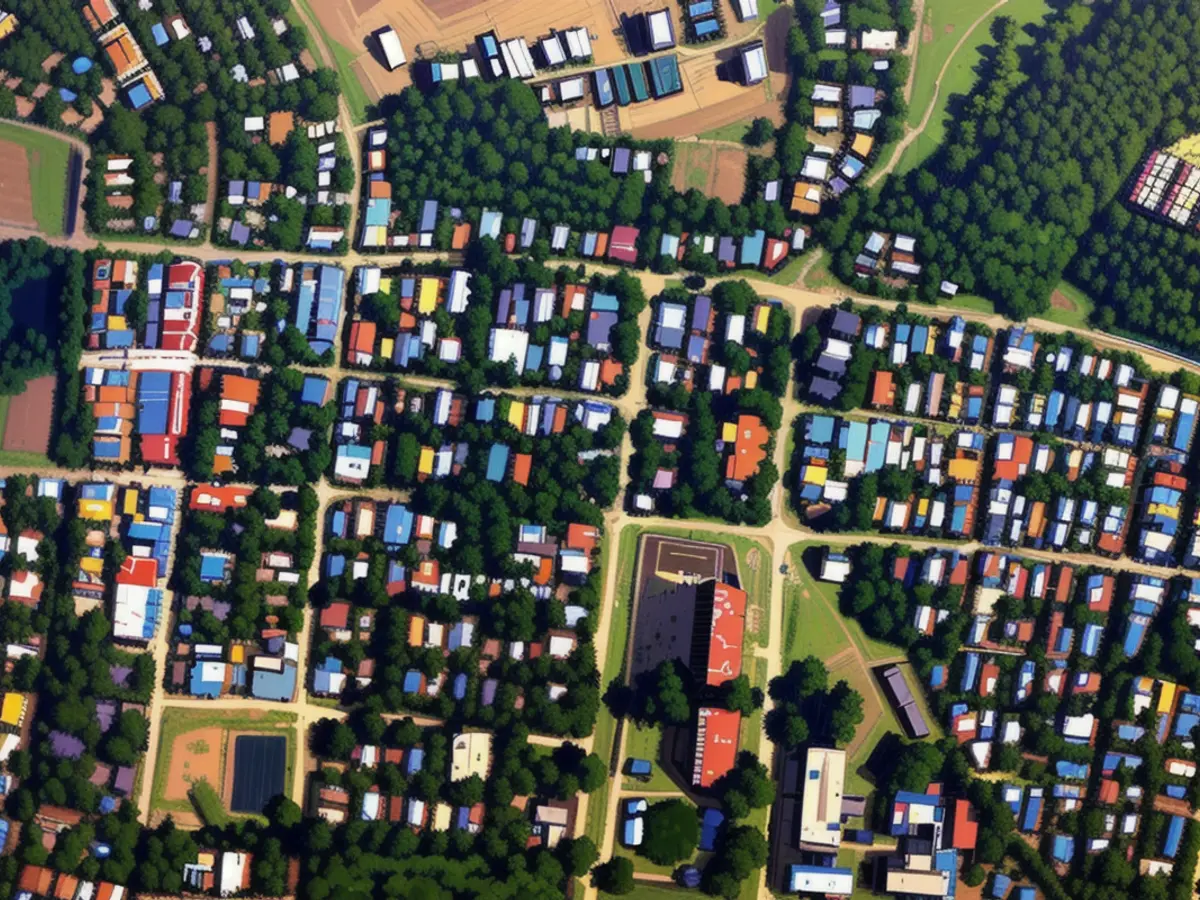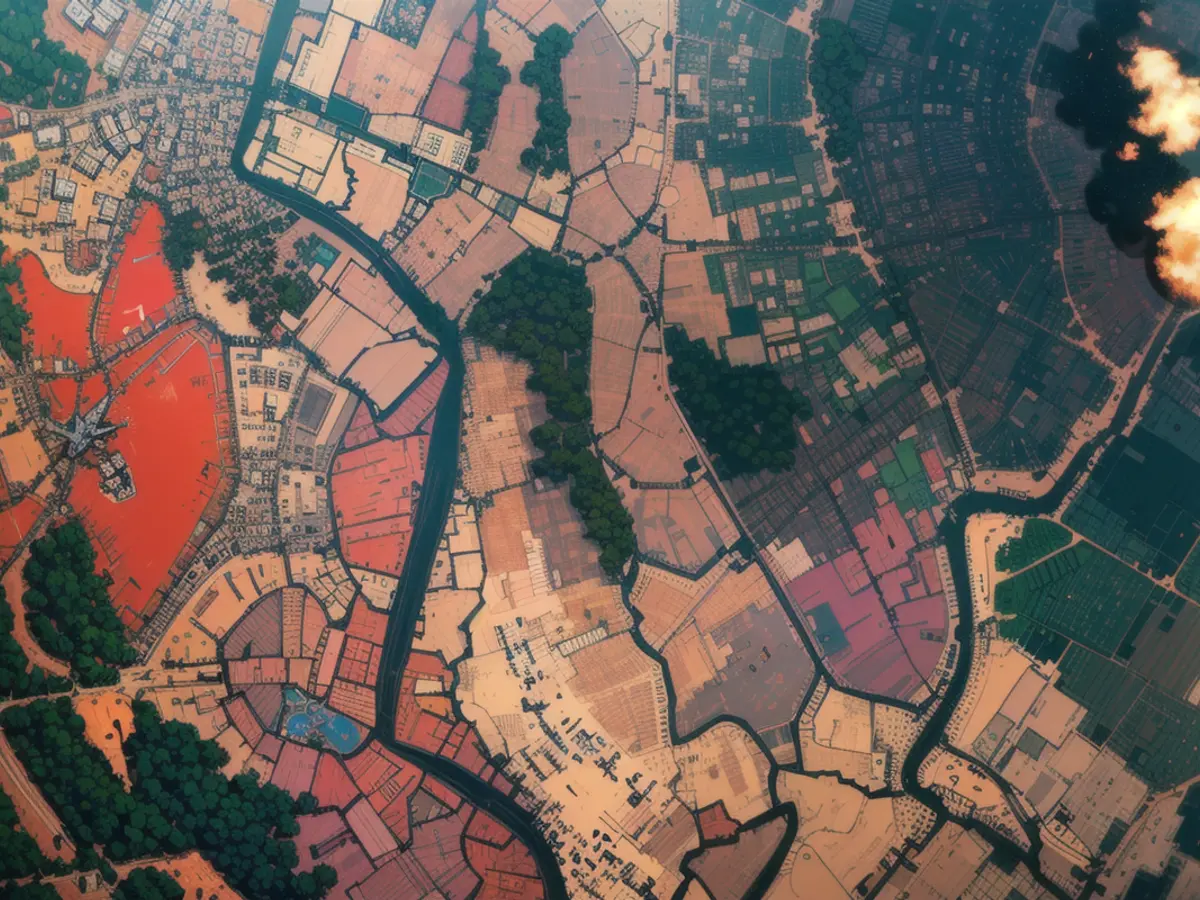Entire town ablaze; Rohingya inhabitants caught amidst Myanmar's civil war flames.
The persecution of Myanmar's Rohingya community has been a continuous tragedy, with many calling it genocide committed by the country's military. Now, they are stuck in the middle of a worsening conflict as the military battles several ethnic armed groups and resistance forces.
Following the military's takeover in February 2021, they've been fighting a growing civil war across Myanmar. In the western state of Rakhine, the Arakan Army, a powerful rebel group, has captured a predominantly Rohingya town near the border with Bangladesh.
There are accounts of AA soldiers setting fire to and looting Rohingya homes in the town of Buthidaung. They've been stopping people from returning home, confiscating phones, and threatening to kill those trying to contact family members overseas.
A government-imposed internet and telecoms blackout in the state makes it hard for families to communicate and for journalists, activists, and monitoring groups to verify the situation.
Farooq, a Rohingya poet living in neighboring Bangladesh, said most of his family were still in Buthidaung, but he couldn't reach them since last Saturday. He only learned then that his family had been forced out of their home and that his house was burned down by the Arakan Army.
Rohingya rights groups and former officials claim 200,000 people were displaced, trying to escape the fires. They say many people, including women and children, spent multiple nights hiding in rice fields with no food, medicine, or possessions. There are also unconfirmed reports of casualties.
CNN doesn't have independent confirmation of these stories, but satellite imagery suggests the fires began early in the day on Saturday. Images from Nasa's Fire Information for Resource Management System show large-scale destruction in Buthidaung. Maxar Technologies' space technology company has provided satellite pictures to CNN that show widespread damage across the town.
"The entire town is burning," said Nay San Lwin, a Rohingya activist from Buthidaung and co-founder of the Free Rohingya Coalition. "Few houses remain intact, only a few."
These attacks remind some of the 2016 and 2017 attacks on the stateless Rohingya community when Myanmar's military launched a campaign of killing, rape, and arson that is currently being investigated at the International Court of Justice.
Today, over a million Rohingya live in what is believed to be the world's largest refugee camp in Bangladesh. But those who stayed in Myanmar face apartheid-like conditions and significant restrictions on movement, education, and healthcare. Over 100,000 Rohingya have been kept in displacement camps by the military and government in the Rakhine state capital for the past decade, while others have braved dangerous sea journeys to Indonesia to escape home conditions.
Young Rohingya men also face conscription by the junta, the Arakan Army, and armed Rohingya insurgent groups in Myanmar and the sprawling Bangladesh camps, where gang violence is escalating.
A council of Myanmar experts warned on Sunday that the Rohingya community is "again at risk of genocide" and implored the UN Human Rights Council to hold a special session addressing the "deteriorating human rights crisis in Myanmar." The UN's rights chief, Volker Türk, issued a statement saying "this is a critical period when the risk of further atrocity crimes is particularly acute."
Recent Attacks on Buthidaung
Clashes between the Arakan Army and Myanmar's military worsened in November when the ceasefire broke down. The AA has gained control of most of Rakhine state in recent months and last week shared that it had taken control of all junta military bases around Buthidaung and the town itself.
A Rohingya advisor to Myanmar's shadow National Unity Government, a government formed in response to the coup, wrote on Saturday that the AA had requested a meeting with elders to leave their homes before the attack. "AA will confiscate the Buthidaung downtown," he wrote, adding "the Rohingya said they will not leave because they have nowhere to go."

In recent weeks, the population of Buthidaung had grown as people fled fighting in nearby villages, according to Rohingya activists.
Nay San Lwin from the Free Rohingya Coalition said that at 9:30 p.m. local time on May 17, AA soldiers entered Buthidaung and started burning homes. There were also reports of junta airstrikes and artillery hitting Buthidaung that day, but there were no military soldiers left in the town, he stated.
"The entire town is burning." said Nay San Lwin from the Free Rohingya Coalition. "Few houses remain intact, only a few."
This situation echoes earlier attacks on the Rohingya community in 2016 and 2017, when Myanmar's military launched a brutal campaign of killings, rapes, and arson. As a result, over a million Rohingya now live in Bangladesh's largest refugee camp, which many consider the worst in the world.
Those who stayed in Myanmar face severe discrimination and restrictions on movement, education, and healthcare. Over 100,000 Rohingya have been kept in displacement camps by the military and government in Rakhine's capital for over a decade. Others have made dangerous boat journeys to Indonesia to escape their home conditions.
Young Rohingya men may also be forced to serve in the military or join insurgent groups in Myanmar and the Bangladesh camps, where gang violence is escalating.
"I inquired about who was responsible for the burnings – they asserted that AA members arrived in town and fired shots into the sky while telling people to abandon their homes or face being burned to death," the individual recounted.
Human rights advocate John Quinley, from Fortify Rights, declared there is "obvious destruction of civilian infrastructure, including Rohingya dwellings."
"In Buthidaung over the past few days, the junta has been launching artillery shelling and airstrikes... and potential indicators that the AA carried out widespread arson during the weekend," he added.
An AA representative, Khaing Thu Kha, stated on Telegram on Friday evening that their group was "evacuating the Muslim communities of Buthidaung and offering food, shelter, and medical treatment for them, including kids, women, and older folks."
The AA has rejected allegations that they torched the town, asserting in a May 20 statement that they adhere to their principle of combating under the military code of conduct and never intentionally target non-military objects.
They accused the Myanmar military, as well as allied Rohingya militant groups (called 'Bengali terrorists' by the AA) of destroying Buthidaung.
According to the AA, the Myanmar military unleashed an extended aerial attack on Buthidaung Township until midnight on May 17 as their final desperate assaults.
Earlier in April, the AA claimed homes of non-Muslim residents in Buthidaung had been burnt down in attacks by 'junta-backed Bengali Muslim terrorist groups' and 'other Muslim militants recently armed and trained by the junta.'

© 2024 Maxar Technologies
Though CNN is unable to confirm these allegations independently, Farooq described it as the AA setting fire to villages and Rohingya homes. He explained there was no ongoing clash with the military at that moment.
"In Buthidaung, as my house and my mother were asked to depart from the village, there was no active skirmish at all. There is no military, no base, no junta there," he stated.
Furthermore, Farooq explained AA troops had cautioned residents not to communicate with those living overseas and that anybody found possessing a Bangladeshi SIM card would be executed.
Nay San Lwin also claimed he had heard reports of AA soldiers seizing cash and mobile phones from fleeing Rohingya individuals.
"They fear they have footage of them torching these houses," he stated.
Recently, residents of Buthidaung have faced escalating violence from the junta, according to human rights organizations and activists. Satellite imagery obtained by CNN from Planet Labs shows that western neighborhoods were impacted by fire damage in mid-April, and the Pan Zinn Chaung Bridge – a key roadway on the eastern border of the city – was razed before the Saturday's arson attacks.
Medecins Sans Frontieres, a humanitarian organization in town, said their offices were burnt down on April 15. "We hear stories of over 200 houses being torched and bear witness to a multitude of people fleeing violence, seeking refuge in a destination directly across from where our office was situated," the group declared at the time.
In light of the violence, a humanitarian calamity in Rakhine state is a primary concern, with newly displaced individuals unable to secure food or clean water.
"There are zero NGOs around to dispense food to them? The military has barred all access," Nay San Lwin asserted. "Also, they are confining people inside these villages. They are not allowed to depart."
The upsurge in violence has prompted a storm of reproaches from human rights organizations and the international community, demanding an end to the fighting, safeguarding civilians, and permitting humanitarian aid to be distributed in Rakhine.
The State Department spokesperson, Matthew Miller, stated the US is "deeply distressed by the accounts of intensified hostilities" in Rakhine state and cautioned "there are potential risks of further atrocities ensuing."
"The military's previous transgressions – including acts of genocide and other crimes against humanity directed at the Rohingya, as well as its history of fueling intercommunal disputes in Rakhine State and elsewhere across the country – underscore the significant threats to civilians," he underlined.
Myanmar's National Unity Government pledged on Tuesday that they "have continuously accepted responsibility for Myanmar's past actions and shortcomings, which allowed deplorable atrocities to be committed against minority groups, such as the Rohingya, Rakhine, and others in Rakhine state."
"We are pledged to preventing any such crimes from occurring again."

CNN's Lucas Lilieholm and Angus Watson contributed to the reporting.
Read also:
- This will change in December
- Dikes withstand water masses so far - Scholz holds out the prospect of help
- Fireworks and parties ring in 2024 - turn of the year overshadowed by conflicts
- Attacks on ships in the Red Sea: shipping companies avoid important trade route
The Arakan Army, a powerful rebel group in Myanmar, has taken control of a predominantly Rohingya town near the border with Bangladesh, causing concern among the Rohingya community in Asia.
Despite the ongoing conflicts and military battles in Myanmar, the international community is urging for a special session at the UN Human Rights Council to address the deteriorating human rights crisis, particularly the risk of genocide towards the Rohingya community, which is believed to be the largest refugee community in the world's worst refugee camp in Bangladesh.
Source: edition.cnn.com







